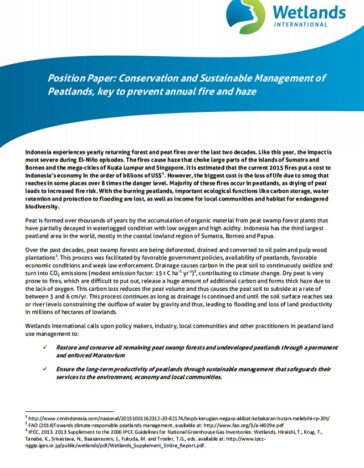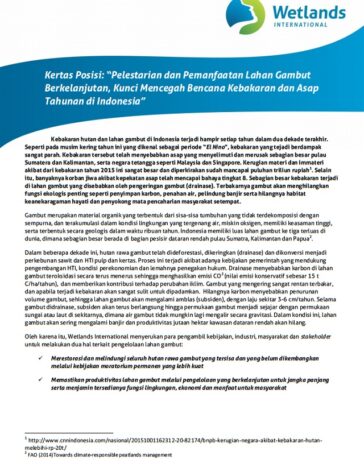
Wetlands International calls for National Peatland Strategy in Indonesia to curb haze disaster
-
Climate mitigation and adaptation
-
Peatland conservation and restoration
Jakarta – Indonesia can only curb the annual fires and haze disasters if it develops a National Peatland Conservation and Restoration Strategy, according to Wetlands International, which presented its recommendations to press today.
In its position statement, Wetlands International emphasizes that Indonesia must address the root cause of the problems and therefore the only long-term answer is sustainable peatland management and restoration. Though Indonesia has various peatland regulations, an overarching strategy is lacking, which is vital for the necessary coordination between ministries and local and regional governments.
Wetlands International proposes the Indonesian government to form a National Advisory Board for Peatland Management, with the main task to develop a National Peatland Conservation and Restoration Strategy. This strategy must guide Indonesia in its transition towards peat swamp forest restoration, conservation and sustainable use.
Wetlands International recommends Indonesia to restore and conserve unused peatland, stop further drainage, block existing drainage canals and phase-out drainage-based plantations on these naturally wet ecosystems. The NGO also promotes an economic development model using the cultivation of commercially attractive native peat swamp species on rewetted peatlands (paludiculture).
The Board and Strategy can advise and coordinate measures that will minimize future fire in peatland areas, enable Indonesia to live up to its international climate change mitigation commitments, prevent the looming future unproductivity of land due to peatsoil subsidence and flooding and reduce threats to biodiversity. It will also help the Indonesian government in the review and streamlining of peat related policies to ensure a coherent and strong regulatory framework that will facilitate sustainable development.
Peat fires and haze are causing serious impacts on the environment, climate, economy and the health of millions of people in Indonesia and neighboring countries. Peat swamp forests are primarily being deforested, drained and converted to oil palm and pulp wood plantations.
See for our position paper in English:
And Bahasa Indonesia:


